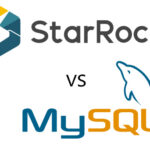Comparison of StarRocks DB, MongoDB, and Redis
| Feature | StarRocks DB | MongoDB | Redis |
|---|---|---|---|
| Data Model | Columnar | Document | Key-value |
| Deployment | Distributed | Distributed | Distributed |
| Use Cases | Real-time analytics, Data warehousing | Application data, User data | Caching, Session management, Message queues |
| Scalability | Horizontal | Horizontal | Horizontal |
| Durability | High | High | Variable |
| Consistency | Eventual | Eventual | Strong |
| Performance | Very high | High | Very high |
| Query Language | SQL | Native query language | Native query language |
| Schema | Rigid | Flexible | No schema |
Here is a summary of the pros and cons of each database:
StarRocks DB
Pros:
- Very high performance for real-time analytics and data warehousing
- Columnar storage for efficient data compression and retrieval
- Horizontal scalability for large datasets
- Eventual consistency for low-latency writes
Cons:
- Rigid schema that can be difficult to change
- Not as flexible as MongoDB for application data
- Not as well-suited for caching as Redis
MongoDB
Pros:
- Flexible schema that can easily accommodate changing data requirements
- Well-suited for storing and querying application data
- Horizontal scalability for large datasets
Cons:
- Not as performant as StarRocks DB for real-time analytics
- Eventual consistency can lead to data inconsistencies
- More complex to administer than Redis
Redis
Pros:
- Very high performance for caching and session management
- Simple key-value data model that is easy to use
- Horizontal scalability for large datasets
Cons:
- Not suitable for storing large amounts of structured data
- No schema enforcement can lead to data quality issues
- Strong consistency can impact performance
Overall, the best database for you will depend on your specific needs. If you need a high-performance database for real-time analytics or data warehousing, then StarRocks DB is a good choice. If you need a flexible database for application data, then MongoDB is a good choice. And if you need a high-performance cache or message broker, then Redis is a good choice.
I hope this helps! Let me know if you have any other questions.
Benchmark Results
Query: SELECT AdvEngineID, COUNT() FROM hits WHERE AdvEngineID <> 0 GROUP BY AdvEngineID ORDER BY COUNT() DESC;

Query: SELECT SearchPhrase FROM hits WHERE SearchPhrase <> ” ORDER BY EventTime, SearchPhrase LIMIT 10;







Leave a Reply